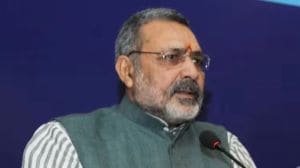New round of Chinese whispers
At its annual conference in Gothenburg, Sweden, in the last week of May, the Nuclear Suppliers Group (NSG) accepted China as its 41st member...

At its annual conference in Gothenburg, Sweden, in the last week of May, the Nuclear Suppliers Group (NSG) accepted China as its 41st member. Constituted in 1974 by seven countries, the NSG coordinates nuclear export policies of supplier nations to ensure that nuclear material and technology transfers for commercial and peaceful purposes are not used to make nuclear weapons. Unfortunately though, the efficacy of technology denial has always been dubious and those keen to acquire nuclear weapons have found ways and means to do so, as well demonstrated by North Korea and Libya.
Attempts at enhancing the effectiveness of the NSG have regularly been made. Insistence upon full scope safeguards (FSS), adding more dual use materials and technologies to the trigger list and expanding the NSG to include new members are some of them. China is the latest entrant and at this juncture, when proliferation concerns are at their highest, given the revelation of the illegal nuclear network run from Pakistan, it is pertinent to analyse the implications of this membership for China’s relationship with Pakistan and non-proliferation.
The first issue concerns China’s own imperative for seeking NSG membership in January 2004. Until the late 1990s, Beijing had criticised the group for being “discriminatory and exclusive in nature and non-transparent in practice”. It argued that such regimes “should be reformed or dismantled” and replaced by “fairer, more transparent and more representative” arrangements. What then brought about the change?
Two reasons can be listed. The first pertains to the commercial benefits of peaceful nuclear technology that China seeks to reap. It is well known that China’s energy demand is rising sharply and it hopes to enhance supply through an ambitious nuclear programme. It plans to build four 1000 MW plants as part of its strategy to quadruple nuclear capacity to 32,000 MW between 2005 and 2020. For this, it requires help, particularly from the US.
The second reason for China’s change in stance is a desire to showcase itself as a responsible nuclear power. This became particularly important once revelations about the illicit nuclear network run from Pakistan came tumbling out and indirectly cast aspersions on China since Pakistan has been the greatest beneficiary of its liberal export policy. Beijing has traditionally nurtured a close nuclear relationship with Islamabad, perceiving it as a critical component of its overall strategy of containment of India. But now China has felt the need to distance itself from the embarrassments of the Pakistani proliferation network and is using the NSG. But what should be worth watching is how Sino-Pak relations will fare in the future. It is not insignificant that China announced the decision to help Pakistan with Chashma II just days before it was accepted as an NSG member! It does expect the relationship to be bound by some constraints. But will the two be able to find newer avenues for cooperation?
Not all NSG members are convinced that this relationship will completely cease. Some even fear that China could act the “spoiler” inside the NSG. But the US has dismissed these apprehensions, arguing that “China takes its responsibilities in international organisations seriously”. It may be imprudent to take all Chinese assurances at face value. A lot of Chinese strategy is still drafted away from public view. China has been known to deny its actions and one can recall the case when it supplied 5,000 specially designed ring magnets to an un-safeguarded Pakistani nuclear laboratory involved in nuclear weapons work. Throughout the controversy, China declared that it was a responsible state and did not support or encourage nuclear proliferation. But later, in talks with US officials, it privately admitted that the sale had taken place, though it insisted it had been arranged by a corporation without the knowledge or consent of the central government.
As of now China discerns greater benefit in accepting NSG guidelines in return for the benefits of peaceful nuclear technology, in view of improving relations with India and managing the fallout from the Pakistan connection. But national interest, as always, shall be the driving force behind its foreign policy and non-proliferation commitments. Therefore, one cannot be complacent just because China is now inside the NSG. In fact, not all NSG members have an impeccable record as nuclear exporters. National interests, bilateral relations and other considerations have swayed nuclear deals.
The future may be no exception unless the nuclear weapon states follow up their non-proliferation agenda hinged upon technology denial with a simultaneous emphasis on reducing the overall salience of nuclear weapons and embrace universal nuclear disarmament.



- 01
- 02
- 03
- 04
- 05




























